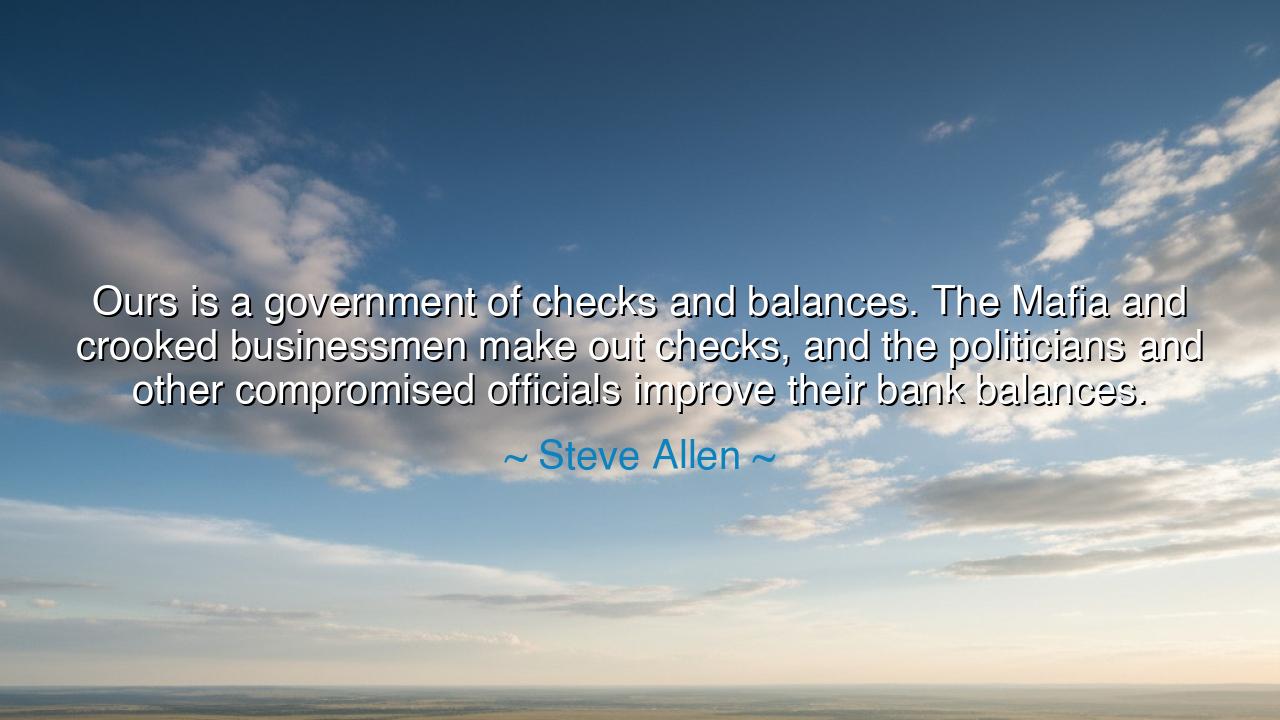
Ours is a government of checks and balances. The Mafia and
Ours is a government of checks and balances. The Mafia and crooked businessmen make out checks, and the politicians and other compromised officials improve their bank balances.






When Steve Allen declared, “Ours is a government of checks and balances. The Mafia and crooked businessmen make out checks, and the politicians and other compromised officials improve their bank balances,” he wrapped a dagger of truth in the cloak of wit. Beneath the humor lies a searing indictment of corruption — the betrayal of public trust by those sworn to defend it. Allen, known for his sharp intellect and moral conscience, used satire to illuminate a grim reality: that the system designed to restrain greed and power can, when left unguarded, be devoured by them. His jest exposes the erosion of integrity that transforms democracy from a covenant of virtue into a marketplace of favors.
The phrase “checks and balances” once symbolized the noble architecture of freedom — the Founders’ grand design to prevent tyranny. Power was to be divided, authority was to be watched, and no man, however exalted, could rule unchecked. Yet Allen’s biting twist reveals how far that ideal can fall. Instead of checks written by conscience and balances held by justice, he saw literal checks changing hands in backrooms — bribes masquerading as policy, influence traded for wealth. It was not merely cynicism he expressed, but moral outrage: the lament that the guardians of democracy had turned its tools into their toys.
To understand the weight of his words, one must recall the long and shameful shadow of corruption that has haunted every government. In America, from the Tammany Hall scandals of the 19th century to the Watergate affair of the 20th, the story repeats itself — men rising to power not to serve, but to profit. Consider the infamous Teapot Dome scandal of the 1920s: government officials secretly leasing federal oil reserves in exchange for personal gifts and money. It was one of the darkest stains on American governance, and it proved Allen’s satire prophetic — when greed replaces honor, even a system built on checks and balances becomes a mechanism of theft.
Yet Allen’s mockery is not meant to destroy faith in government, but to awaken it. Satire, when wielded by the wise, is not cruelty — it is medicine for moral blindness. He forces us to look inward and ask: How did the guardians of the people become servants of the powerful? The answer lies not in a single villain, but in a slow corrosion — a thousand small compromises where truth was traded for expedience, and principle for gain. The true danger, he reminds us, is not the criminal outside the law, but the official who corrupts the law itself.
There is, too, a warning here for every citizen. For corruption thrives not only in marble halls but in the silence of those who look away. A people who laugh at dishonesty, who shrug at deceit, soon become ruled by it. The “checks and balances” of a republic depend not only on institutions but on the moral courage of its citizens. When voters cease to demand integrity, when they value comfort more than conscience, they become complicit in their own betrayal. As Allen’s words imply, a corrupt government reflects a complacent people.
History offers a glimmer of hope, however. Whenever corruption has threatened to suffocate liberty, there have risen voices to expose it — journalists, reformers, whistleblowers, and ordinary citizens who refused to be bought. The Watergate journalists, Woodward and Bernstein, serve as one such example. Their pursuit of truth, despite immense pressure, brought down a president and reminded the world that power can still be held to account. Through their courage, the nation rediscovered that honor, though fragile, can still triumph over deceit when light is shone into darkness.
The lesson in Allen’s satire is both somber and sacred: never let the laughter conceal the warning. For humor fades, but truth endures. Every generation must renew the covenant between power and principle, wealth and responsibility, freedom and virtue. When corruption becomes commonplace, resistance must become duty. When dishonor is rewarded, honesty must become defiance.
Therefore, remember: a republic does not perish when it is attacked from without, but when it rots from within. Guard your conscience as fiercely as your vote. Demand transparency, even when it is inconvenient; prize character over charisma, and truth over comfort. For only then will the words “checks and balances” return to their rightful meaning — not as a jest of cynicism, but as a living promise that justice still holds the scales.






AAdministratorAdministrator
Welcome, honored guests. Please leave a comment, we will respond soon